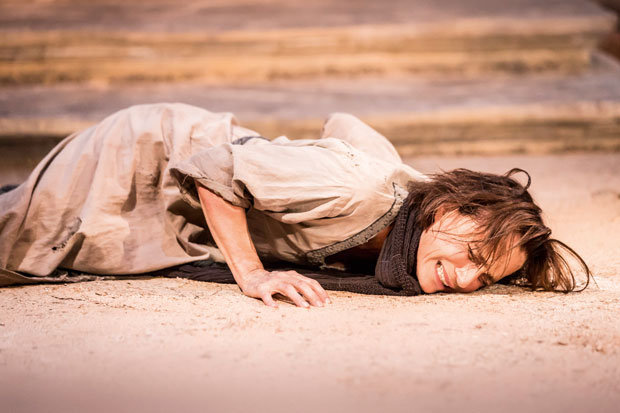First, a bit of background. Conquering Agamemnon slew his daughter, Iphigenia, in return for a fair wind to Troy. This rather miffed his wife, Clytemnestra, who bashed his head in with an axe when he came swaggering home. Her retribution laid a religious duty on their son, Orestes, to avenge his dad by slaying his mum, which, in its turn, put a bit of a crimp in his social calendar.
Sophocles’ play opens during a lull in the butchery. Orestes, now in exile, throws Clytemnestra off her guard by releasing details of his death. The details consist of an urn containing his ashes delivered to the palace. The arrival of the deceitful vessel prompts a fit of agonised hysterics in his sister, Electra, who loathes her mother, for obvious reasons, and who has spent years pining and weeping on the palace doorstep, praying that Orestes will show up, heavily armed and in a bad mood. When he arrives, blades are drawn.
The exposition in Frank McGuinness’s version feels clumsy because Sophocles’ audience knew the tale backwards and needed no primer. And the action drags, I’m afraid, because we westerners have been reared on TV scripts, aimed at fidgety channel-hoppers, that are so carefully written and edited that not a syllable, not a beat, is wasted. About half of this play, the second half, is genuinely gripping. (You can tell because the coughing stops.) Kristin Scott Thomas, ethereally majestic as always, plays Electra with a studied informality that she supplements with zinging passages of rage and bitterness. Not all her choices are persuasive. When she fails to recognise Orestes, for reasons that are unclear, she squinnies uncertainly in his direction and then sniffs him all over like a police Labrador checking out a drug mule.









Comments
Join the debate for just £1 a month
Be part of the conversation with other Spectator readers by getting your first three months for £3.
UNLOCK ACCESS Just £1 a monthAlready a subscriber? Log in